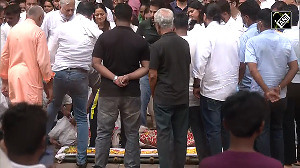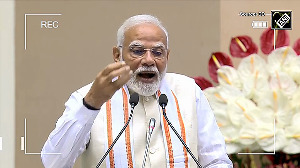Four of the 11 members of a US commission have opposed designating India as a 'Country of Particular Concern', but voiced concerns over the religious violence there.
The US Commission on International Religious Freedom, set up to advise Congress, the president and the secretary of state, had recommended 11 countries, including India and Pakistan, to be named as CPC, but the secretary of state accepted its advice only on five -- China, Myanmar, North Korea, Iran and Sudan.
The Commission Chairman Michael K Young, Vice Chair Felice Gaer and its only Indian member Preeta D Bansal, dissented from the recommendation; Commissioner Archbishop Charles J Chaput joined them, saying he would place India on the watchlist rather than brand it a CPC.
But the dissenters were harsh on India's record.
"We remain deeply concerned over incidents of religiously-based violence in Gujarat and other parts of India that have resulted in loss of life, physical abuse, displacement and other abuses," they said.
"Moreover, we are very concerned that justice has not been done for the victims of the violence against Muslims that took place in Gujarat in early 2002, and that incidents of mob violence against Christians, Muslims and other religious minorities have continued in parts of the country, but we respectfully dissent from the decision to recommend that India be named as CPC," they stated.
"Nonetheless, despite our concern, we feel that adding India to the list of CPC list of nations is inappropriate at this time. India has the legal and democratic traditions to deal with religious intolerance and should be strongly encouraged to do so."
But the majority in the commission held the view that "in India, violence, including fatal attacks, against Muslims and Christians continues..."
"In Pakistan," it said, "there continues to be an inadequate government response to vigilante violence frequently perpetrated by Sunni militants against Shi'as, Ahmadis and Christians.
"Official government policies result in other religious freedom violations, including imprisonment under the anti-Ahmadi and blasphemy laws."





